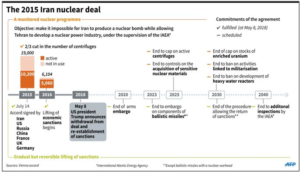In news
Result of the USA’s Presidential election has brought light on Joint Comprehensive Plan of Action
What is the Joint Comprehensive Plan of Action?
- JCPA or Iran Nuclear deal is a detailed agreement with five annexes reached by Iran and the P5+1+1 (China France, Germany, Russia, the United Kingdom, and the United States & EU) on July 14, 2015
- The deal to prevent Iran from producing a nuclear weapon — something Iran insists it does not want to do — by putting curbs on its atomic programme in exchange for economic incentives.
- It was also endorsed by UN Security Council Resolution 2231, adopted on July 20, 2015
Key features of JCPA
- According to the deal, Iran reduced the number of its centrifuges used for enriching uranium by two-thirds, restricted its uranium enrichment to 3.67%, and removed the core of its heavy water facility in Arak.
- Iran’s compliance with the nuclear-related provisions of the JCPOA is verified by the International Atomic Energy Agency (IAEA)
- Following the issuance of an IAEA report on Iran’s efforts towards the deal, the UN sanctions against Iran and some EU sanctions will terminate and some will be suspended.
- As per the deal Iran is required to allow International Atomic Energy Agency (IAEA) inspectors to access any site they deem suspicious.
- Inspectors from the IAEA continuously monitor Iran’s declared nuclear sites and also verify that no fissile material is moved covertly to a secret location to build a bomb.
- 15-year term: After the 15 years, the treaty will come to its term; then the extraordinary restrictions will no longer be applicable

















